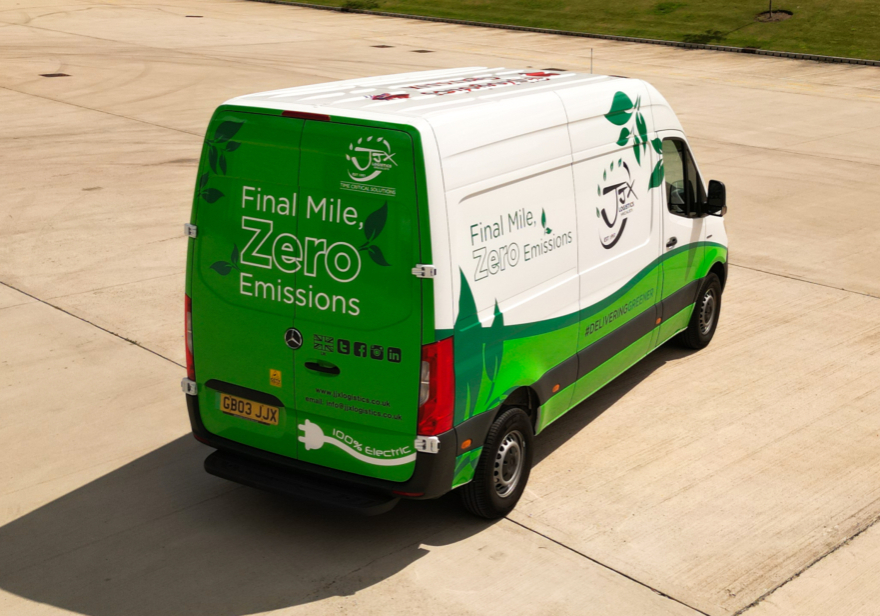With HGVs making up nearly 20% of UK road emissions, sustainable logistics practices are crucial to advancing eco-friendly practices and modern supply chain management. By integrating sustainable strategies, organisations can minimise waste and enhance operational efficiency.
This approach involves efficient packaging, optimised transportation, the use of eco-friendly vehicles and more to achieve cost savings while simultaneously improving their reputation and brand image.
Ultimately, the adoption of sustainable logistics not only contributes to environmental preservation but also yields tangible business advantages, making it a serious consideration for modern logistics companies.

Common Practices of Sustainable Logistics
Sustainable logistics involves several common practices aimed at reducing environmental impact and increasing efficiency. Below are some of the main methods employed across the logistics sector.
Optimised Route Planning
Logistics companies can employ efficient route planning to minimise fuel consumption and emissions while maximising delivery efficiency.
By utilising sophisticated software and analytical tools, companies can identify the most efficient routes, considering factors such as traffic patterns, delivery schedules and vehicle capacities. This allows for the consolidation of shipments and the reduction of empty miles travelled, ultimately leading to significant fuel savings and lower emissions.
Consolidation of Shipments to Reduce Emissions
The consolidation of shipments is a critical strategy within sustainable logistics practices. By combining multiple smaller shipments into a single, larger shipment, companies can significantly decrease the number of vehicles on the road. Reducing the overall energy consumption per unit of freight not only decreases any environmental impact but also results in cost savings for businesses through more efficient transportation.
Use of Electric, Hybrid or Fuel Efficient Vehicles
Adopting electric, hybrid or fuel-efficient vehicles is a common practice in sustainable logistics for reducing carbon emissions and promoting environmental responsibility. Electric vehicles (EVs) produce zero tailpipe emissions, contributing to improved air quality and reduced emissions. Similarly, hybrid vehicles combine a traditional combustion engine with an electric motor, offering increased fuel efficiency and decreased reliance on fossil fuels.
Internal combustion engines (ICE) are still viable for sustainable logistics and do not require investment in additional infrastructure. Fuel-efficient ICE vehicles, including those powered by cleaner diesel or advanced gasoline engines, minimise the environmental impact of transportation activities without the need for charging.
Efficient Packaging and Materials
Efficient packaging and recyclable materials play a crucial role in promoting environmentally responsible and cost-effective practices within logistics operations. By using packaging that is appropriately sized, lightweight and made from sustainable materials, companies can significantly reduce waste.
Additionally, optimising packaging design can lead to more efficient use of transportation space, reducing the number of shipments required and thereby lowering total fuel consumption.
Benefits of Sustainable Logistics
The benefits of sustainable logistics not only contribute to environmental preservation but also help position companies as responsible and forward-thinking entities in the marketplace. Below are some of the main benefits for investing in more sustainable logistics.
Decreased Pollution and Emissions
A significant benefit of sustainable logistics is the decrease in pollution and emissions. By using optimising transportation routes and investing in fuel-efficient vehicles, logistics companies can significantly reduce their carbon footprint.
This not only helps to mitigate the negative impact of transportation on the environment but also contributes to cleaner air and improved public health. Additionally, the growing demands of sustainable logistics can lead to the development and implementation of eco-friendly technologies and practices, further promoting a cleaner and healthier environment for future generations.
Conservation of Natural Resources
By implementing sustainable practices such as reducing packaging, optimising transportation routes and utilising renewable energy sources, businesses can minimise their impact on the environment and conserve natural resources.
Embracing sustainable packaging and materials, as well as promoting recycling and reuse, further contributes to the conservation of natural resources such as wood. Ultimately, these initiatives not only benefit the environment but also lead to cost savings and long-term resilience for businesses operating within the logistics industry.

Cost savings & Increased Efficiency
When it comes to sustainable logistics, cost savings and increased efficiency are key benefits to businesses:
With diesel costs taking up around 30% of total costs to operate a vehicle, lower fuel consumption is a key driver for achieving cost savings and increased efficiency in logistics operations.
By optimising routes and investing in fuel-efficient technologies, companies can significantly reduce their overall fuel consumption. This not only lowers operational costs and allows for more competitive pricing, but also minimises environmental impact associated with burning fuel.
A significant aspect of achieving cost savings and increased efficiency in sustainable logistics is the reduction of waste and packaging costs.
By implementing sustainable practices such as reducing over-packaging where possible and improving waste management processes, companies can minimise unnecessary expenses associated with excessive packaging and disposal.
This not only leads to direct cost savings but also contributes to environmental conservation and enhances the overall efficiency of the logistics operations.
Warehouses, on average, take up to 6.2 kilowatt-hours of energy to power each year. With rising energy prices seen across the globe, this can have serious impacts on a logistics company’s bottom line. By implementing energy-saving measures such as using energy-efficient electronics and using renewable energy sources where possible, logistics companies can significantly reduce operational costs.
Improved Reputation and Brand Image
An enhanced reputation and brand image are two key benefits derived from investing in sustainable logistics. By prioritising these initiatives, companies can showcase their commitment to environmental and social responsibility which often resonates positively with consumers and stakeholders. This can lead to increased trust and loyalty from customers, as well as a competitive edge in the market.
A strong reputation for sustainability can also attract top talent, a recent survey indicating that around 67% of employees would prefer to work for an eco-conscious company. The logistics sector currently suffers from one of the highest employee turnover rates in the UK, so the potential for employee retention is of particular importance.
JJX Logistics’ Commitment to Sustainability
At JJX Logistics, corporate sustainability is a top priority. We believe in meeting the needs of our customers and employees without harming the ability of future generations to meet their own needs.
We are fully committed to the European Commission's ambitious CO2 emission targets for HGVs. We firmly believe that these targets will help move the road transport sector towards zero-emissions and help lower demand for fossil fuels.
To use energy from renewable sources for our premises and to exponentially invest in electric vehicles on target to meet the European Green Deal. We will also play our part in educating and advancing the future of our industry supporting CILT’s Generation Logistics.
JJX Logistics' Green Mission Statement
We're ready when you need us

